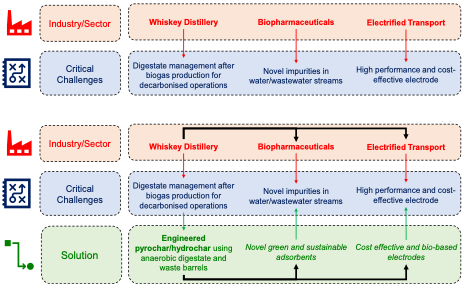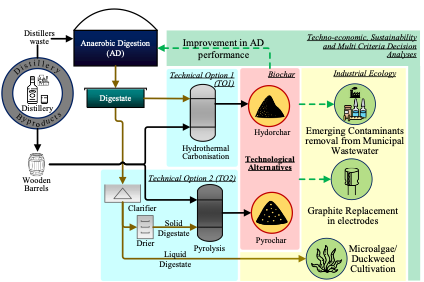
EMERGE

- Title:
-
Engineered organic carbon-based functional material for energy and water (EMERGE)
- Start Date:
-
01st of June 2023
- End Date:
-
30th of November 2024
- Funding Body:
-
Science Foundation Ireland under National Challenge Fund 2023 program
- Coordinator:
-
Dr Archishman Bose, Eli Lilly Lecturer in Process and Chemical Engineering, University College Cork (UCC), Ireland; Environmental Research Institute, UCC; Circular Economy, Energy and Environmental Systems (CEEES) Research group, MaREI, the SFI Centre for Energy, Climate and Marine
- Co-Lead:
-
Dr Xue Ning, PostDoctoral Researcher, University College Cork (UCC), Ireland; Environmental Research Institute, UCC; Circular Economy, Energy and Environmental Systems (CEEES) Research group, MaREI, the SFI Centre for Energy, Climate and Marine.
- Project Partners:
-
Irish Distillers Ltd, Middleton, Cork
- Principal Investigators:
- Research Area:
-
Advanced Fuels in the Circular Economy; Circular Bioeconomy and Biorefinery
- Website:
Introduction
The EMERGE project aims to provide a sustainable technological solution to three different key sectors in Ireland’s economy viz anaerobic digestion, wastewater treatment, and industries requiring electrodes (such as batteries). The EMERGE project will utilise the digestate from anaerobic digesters (ADs) operating using distillery by-products to produce pyrochar and hydrochar. While engineered pyrochar/ hydrochar would allow safe and economic use of the AD effluents, it would form a novel adsorbent for the removal of novel and emerging contaminants from municipal wastewater industries (Figure). Engineered pyrochar/ hydrochar can also be used as sustainable energy-dense material for electrodes and as graphite alternative; graphite is a critical raw material in the European Union. In this regard, the project will now aim to develop engineered pyrochar/ hydrochar to allow safe and economic use of anaerobic digestate, while forming a novel adsorbent of novel and emerging contaminants from the municipal wastewaters and sustainable energy-dense material for electrodes.

Aim
The aim of the EMERGE is research on testing the engineered carbon-based materials for three primary applications, namely, in:
- Energy materials and energy storage as electrode materials for batteries, capacitors, and supercapacitors. The enhanced surface area, conductivity and stable 3-D like structure may help to achieve higher energy and current density which could be close to the existing fossil-based carbon electrode.
- Novel adsorbent materials for water purification. Engineered bio-based materials will have higher surface area which may help in adsorbing the emerging contaminants from municipal wastewater like antibiotics and Per- and Polyfluorinated Substances (PFAS), as well as heavy metals.
- Low-carbon fuel production via their use as additives for exiting anaerobic digesters. This is based on the recent study published by Xue et al. (2023) and Deng et al. (2021) that biochar additional significantly increases performance of AD and therefore acting as a much cheaper and sustainable alternative to carbon graphite
Work Packages

Contact
Dr Archishman Bose
BEng (JU), MSc (KTH, PoliTo) PhD (UCC)
Eli Lilly Lecturer, Process and Chemical Engineering,
School of Engineering and Architecture
University College Cork
College Road, Cork, T12 K8AF, Ireland
Affiliate PI, Environmental Research Institute
Circular Economy, Energy and Environmental Systems (CEEES) Research Group
MaREI Centre for Energy Climate and Marine
Dr Xue Ning
PostDoc Researcher & Manager (Laboratory)
Circular Economy, Energy & Environmental systems Research Group
Advanced fuels in circular economy
Environment Research Institute (ERI)
MaREI Centre for Energy, Climate and Marine (MaREI)
Ellen Hutchins Building
University College Cork (UCC)
Lee Road, Cork City, Ireland
Prof. Jerry Muprhy (Mentor)






